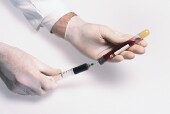Baxter Recalls Rest of Heparin Products
Investigation into allergic reactions, deaths related to blood thinner continues.
By Steven Reinberg
HealthDay Reporter
|
E-mail this article
Subscribe to news
Printer friendly version
|

(SOURCES: Feb. 28, 2008, teleconference with Rear Admiral Sandra Kweder, M.D., deputy director, Office of New Drugs, Center for Drug Evaluation and Research; Michael Rogers, director, Division of Field Investigations, Office of Regulatory Affairs, U.S. Food and Drug Administration, Rockville, Md.)
THURSDAY, Feb. 28 (HealthDay News) -- Baxter Healthcare Corp., the pharmaceutical company at the center of recent problems with its blood thinner heparin, announced Thursday that it was recalling any remaining multi-dose vials of the drug as well as single-dose vials.
The company also said it was recalling its Hep-Lock heparin flush products, which contain a small amount of heparin and are used to prevent blood clots in intravenous lines.
The recalls were made possible because the other manufacturer of multi-dose heparin vials -- APP Pharmaceuticals of Schaumburg, Ill. -- was able to assure the U.S. Food and Drug Administration that it could meet the demand for the blood thinner in the United States.
"At the time [in January] when Baxter stopped production of its multi-dose heparin, we determined there would be an immediate and severe shortage of this medically necessary drug," Rear Admiral Dr. Sandra Kweder, deputy director of FDA's Office of New Drugs in the Center for Drug Evaluation and Research, said during an afternoon teleconference Thursday. "Therefore, it was in the interest of the public health to allow multi-dose vials to remain on the market, but to be used with caution."
"Today," Kweder added, "we can report that APP is now able to adequately supply the U.S. market."
As far as Baxter's Hep-Lock products are concerned, there are several manufacturers of similar items, Kweder added.
"We have assurance from the U.S. Food and Drug Administration that there is an adequate supply in the market to meet the demand for these critical and lifesaving drugs," Peter J. Arduini, president of Baxter's Medication Delivery business, said in a statement. "The safety and quality of our products is always our highest priority, and we will continue to collaborate with the FDA as we work to determine the cause of the increased rate of adverse reactions and resolve this issue."
Since the end of December, there have been 448 reports of adverse reactions associated with Baxter's heparin product. This compares with less than 100 reports of adverse reactions in all of 2007.
There have also been reports of 21 deaths, four of which were linked with an adverse reaction to heparin, according to the FDA.
Most of the reactions have taken place at hemodialysis centers, almost exclusively involving patients receiving a "bolus dose," which is a high dose administered over a short period of time, according to the FDA. The drug is also given to patients undergoing heart surgery.
Adverse reactions included difficulty breathing, nausea or vomiting, excessive sweating and falling blood pressure, which can lead to life-threatening shock. These reactions have been seen with as few as several thousand units per milliliter of heparin, and as much as 50,000 units per milliliter.
So far, the source of the problems with heparin has not been identified, Kweder said, adding the investigation is continuing.
The FDA investigation has included a Baxter plant in the United States, as well as a supplier of unrefined heparin to Baxter, Changzhou SPL in Changzhou City, China. The Chinese plant is largely owned by Scientific Protein Labs in Waunakee, Wisc., which is Baxter's main supplier of heparin.
"Our inspection team has finished the inspection of the Chinese facility," Michael Rogers, director of the FDA's Division of Field Investigations in the Office of Regulatory Affairs, said during the teleconference. "The inspection revealed that the facility is currently not manufacturing heparin at this time."
Rogers said the inspection team found "a number of potentially objectionable conditions related to the firm's manufacturing process."
"The inspection team's observations relate to deficiencies in the plant's evaluation of the steps it takes to remove impurities and its investigation of out-of-specification results. Issues related to waste material flow and deficiencies related to equipment," Rogers said.
Rogers noted that while the FDA was concerned about what it found in the Chinese plant, it was not prepared to make a connection between these observations and the adverse events associated with Baxter's heparin.
Inspection of the Chinese plant came after the FDA reported Feb. 19 that it had made a mistake and inspected the wrong Chinese plant, which had a similar name.
More information
For more on heparin, visit the U.S. National Library of Medicine.
Copyright © 2008 ScoutNews, LLC. All rights reserved. 
HealthDayNews articles are derived from various sources and do not reflect federal policy. healthfinder.gov does not endorse opinions, products, or services that may appear in news stories. For more information on health topics in the news, visit the healthfinder.gov health library.